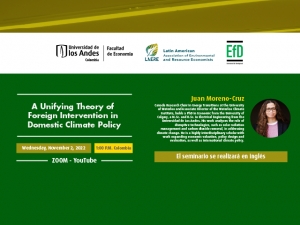Manuela Fonseca
Forest fires and impacts of COVID-19 lockdowns on air quality in four Latin American megacities
Jorge A Bonilla. 2022. Forest fires and impacts of COVID-19 lockdowns on air quality in four Latin American megacities. Environmental Research Letters 17 (10).
Participatory interventions for collective action and sustainable resource management: linking actors, situations and contexts through the IAD, NAS and SES frameworks
Juan Felipe Ortiz-Riomalo, Ann-Kathrin Koessler, Yaddi Miranda-Montagut, Juan Camilo Cardenas. 2022.Participatory interventions for collective action and sustainable resource management: linking actors, situations and contexts through the IAD, NAS and SES frameworks.Sustainability Science 1-18.
Distributional and economy-wide effects of post-conflict agricultural policy in Colombia
A. Saldarriaga-Isaza DE. Jiménez, M. Cicowiez. 2022. Distributional and economy-wide effects of post-conflict agricultural policy in Colombia. European Review of Agricultural Economics (49) 3, 644 - 667.
Implicaciones metodológicas e inconsistencias de la Tercera Comunicación Nacional sobre Cambio Climático de Colombia
Arias, P.A.; Villegas, L.D.; Mesa, O.J.; Pabón, J.D.; Arango, J.; Arango-Aramburo, S.; Armenteras, D.; Barahona, R.; Berrouet, L.; Barco, J.; Cardona, Y.; Carvajal-Escobar, Y.; Ceballos-Bonilla, L.I.; Cerón, W.L.; Escobar, J.H.; González, C.; Hoyos, I.C.; Hoyos, N.; Jaramillo, C.; Jiménez-Sánchez, G.; Martínez, J.A.; Poveda, G.; Quesada, B.; Quintero-Vallejo, E.; Rendón, Ángela M.; Ruiz-Carrascal, D.; Salazar, A.; Salazar, J.F.; Sánchez, A.; Vieira, S.C.; Villegas, J.C.; Villegas-Palacio, C.; Zuluaga, M.D. 2022. Implicaciones metodológicas e inconsistencias de la Tercera Comunicación Nacional sobre Cambio Climático de Colombia. Revista de la Academia Colombiana de Ciencias Exactas, Físicas y Naturales, 46(180):769–794.
Seminario LAERE-EfD: A Unifying Theory of Foreign Intervention in Domestic Climate Policy
Abstract: Given the global nature of the climate and the economy, climate policy that meaningfully reduces the impacts of climate change will require collaboration between sovereign nations. Characteristics of climate policy instruments, however, have made collaboration difficult. For example, emissions cuts suffer from a free-riding problem while solar geoengineering suffers from a free-driving problem. Foreign countries have at least three options to intervene in domestic climate policy in a Target country: i.) Agreement Interventions, such as international environmental agreements; ii.) Policy Interventions, such as rewards or sanctions; and iii.) Institutional Interventions, such as conflict. In this paper, we derive a theory of climate policy-motivated foreign intervention. We distill the fundamental properties of different climate policy instruments into a simple parameterization and examine the incentives and preferences of each foreign intervention option. Specifically, we consider intervention
preferences for climate policies that suffer from free-riding or free- driving. We find that the ordering of foreign intervention preference depends critically on the parameters that determine if a policy suffers from free-riding or free-driving.
Short-bio: Juan Moreno-Cruz, Canada Research Chair in Energy Transitions at the University of Waterloo and Associate Director of the Waterloo Climate Institute, holds a PhD in Economic from the University of Calgary, a M.Sc. and B.Sc. in Electrical Engineering from the Universidad de Los Andes. His work analyzes the role of disruptive technologies, such as solar radiation management and carbon dioxide removal, in addressing climate change. He is a highly interdisciplinary scholar with work expanding economic valuation, policy design and evaluation, as well as international climate policy.
Inscripciones aquí| Register here
Live transmission: https://youtu.be/poFCy6yyO-0
Oil, Politics, and “Corrupt Bastards”
Alexander James, Nathaly M Rivera
Journal of Environmental Economics and Management 111, 102599
Coal-to-gas fuel switching and its effects on housing prices
Nathaly M Rivera, Scott Loveridge
Energy Economics 106, 105733
Competition and prosociality: A lab-in-the-field experiment in Ghana
Kerstin Grosch, Marcela Ibañez, Angelino Viceisza
Journal of Behavioral and Experimental Economics 101887
Diagnóstico y recomendaciones sobre el ordenamiento territorial en Colombia:propuestas para el cumplimiento de los Acuerdos de Paris
Víctor Saavedra, Fernando Carriazo, Juan-Fernando Junca, Rafael Puyana, Carlos-Felipe Reyes, María-Mónica Salazar
Bogotá: Fedesarrollo, 700 p. ISBN 978-958-52187-7-2
Perspectiva de género: una necesidad multidimensional
Daniela Gonzáles, Jimena Hurtado Prieto, María del Pilar López Uribe, Laura Ortiz
Nota Macroeconómica No 39 Edición Especial Debate Electoral
